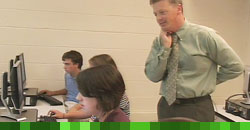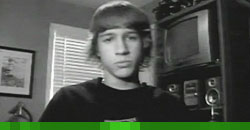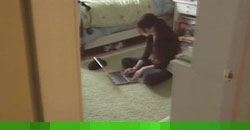


Dear FRONTLINE,
As a middle-school teacher in the Bronx, I can attest that online interactions--gossip, bullying, flirting, etc.--create an overwhelming subtext, often a disruptive one, to the classroom community. Many fights, instigated online, break out in the classroom, but unlike "in person" conflicts, of which I am usually aware and for which I can offer preventative intervention, the online dynamics are invisible to me until their effects manifest at school. The effect is bewildering, and I find that my most instinctive (though least correct) response is just to want to "shut out" the online influence upon my classroom. Though I myself use social networking sites occasionally to meet up with friends, etc., my first reaction to this interference was very "anti-Internet."
However, having viewed the Frontline program, I now feel that the cyberspace, like the subway, the market, or even school itself, is, in fact, a social space and site of social communication; it makes no more sense to cry for banishment of the Internet than it would have a century ago to rail against the telephone, on the grounds that it might be misused for gossip or harassment. What is critical is for parents to instruct their children in appropriate comport when online, just as parents instruct children in other behaviors: saying "please" and "thank you," waiting one's turn, the appropriate way to answer the phone, and so on. Because of the generation-technology gap, parents have avoided their responsibility in this way to a large extent, and (in some cases) their techno-phobia about the Internet has allowed their children to exploit cyberspace as a "parent-free zone." The Internet is clearly not waning any time soon; perhaps it is time for more parents, like Evan Skinner, to take an active role in instructing their children in online values, regardless of whatever resistance they may encounter from their predictably annoyed offspring.
Leah Hooper
New York, New York
Dear FRONTLINE,
I was 18 when the internet began to take it's hold on America. I was a freshman at a major University. Email was a new technology that the sophomores ahead of me did not even have an account. By the time I graduated, all incoming freshmen were required to obtain an email account before they could even register for classes.
I was also just coming out of the closet as a homosexual. The internet served as a place for me to chat with other gays and explore my sexuality. (Back then gays were not as visible, and Will and Grace had not become a hit.)
What I learned from those early days of the internet is a social skill most of us have not taught our children to apply online: treat others as you would like to be treated; say please and thank you; don't pretend to be something you're not. In this age of instant gratification, we forget those cordial social rules of engagement. The same goes for email. It should not read like a text message you'd send to a friend. It should be formal and look very much like a letter.
The internet does not have to be evil. The forum does not have to be a rude environment. We have a wonderful opportunity to make it an amazing form of social interaction. We cannot forget that what happens online can translate into behaviors offline.
NY, NY
Dear FRONTLINE,
I thought one of the most telling comments in this documentary was the one by the author of "Unravelling Facebook (or was is MySpace?). She said (and I paraphrase here), "The Internet has created the greatest generation gap between parents and kids since the birth of rock and roll." Yet, most of the parents that expressed such concern about the way their children are immersed in the on-line world, are very likely to have been the children who stared unblinkingly at Elvis swiveling his hips on the Ed Sullivan Show to the horror of their parents." We all survived adolescence, despite our parents, I am confident today's digital youth will do the same.
George Loftus
Newport, RI
Dear FRONTLINE,
I watched Growing Up Online, I was taken by over-whelming paranoia that parents experience raising children in an internet world. Yes, we are living in a world that is increasingly transparent because of the internet, but, by no means is the world any different then when my parents grew up. They grew up in a society where drug use and sexual activity was widespread. We are growing up in a culture where information is widespread. While they were uninformed; we are well informed.
I think parents are doing a poor job of parenting in this era and need to learn to communicate better and let go of this seemingly threatening new technology that is dismantling the family system. Critics have always debunked technology, as a means of over-exposure to society, but, is it really over-exposure or just exposure that the suburban mindset lacks.
The City, Matthew DeTemple
Matthew DeTemple
forest hills, NY
Dear FRONTLINE,
hey parents...
the internet is a GOOD thing. if you are concerned with what your children are doing with the internet, TALK to them about it. don't take their computer away; don't take their technology away. if you do this, you will take away their means of self-expression. the world has changed now and America's youth finds a tremendous usefulness and connection to their online worlds. it is their curiosity and intelligence which makes them go to the computer. it transcends their world. you have to find a way to be part of this world and communication, tolerance and understanding is the key.
robert harper
san mateo, california
Dear FRONTLINE,
I just watched this program online, and as a parent am fully aware of the dangers of the internet, especially cyber-bullying. This is probably the most important issue to deal with. As I've observed children as a teacher and also a parent lose their sense of boundaries, both societal and interpersonal, it can ONLY be blamed on the internet.
The most glaring error of this report is - where is parenting throughout these stories? As another poster said, I pay for the internet and it can be taken away. Privacy is not a right in this household, especially for teenagers. They can have privacy when they move out. My computer is in the living room - and we utilize a software that monitors what they are saying. Yes, they know about that too - they were angry at first, but that's too bad. Parents make decisions that anger their children. (If you don't you're not a very good parent.) If the kids change their passwords I will know about it, and remove the computer - it's simple as that. I don't overreact to everything they're talking about, but it does give me an insight to what they are doing and thinking.
Usually I bring up a conversation about a topic (like smoking, for example); what I don't do is say, "Ok, I read that you said this - would you explain yourself?". Putting kids on the defensive will not get you anywhere. If they ever began talking about suicide I definately would interven. Preventive medicine, not after-the-fact knee-jerk reactions.
Too many parents throw their hands up in the air and say, "Oh, you can't do anything about this new generation". You can and you SHOULD.
Charleston, IL
Dear FRONTLINE,
A lot of the parents in the US need to stop watching Dateline and start talking to their kids honestly and respectfully about things like responsible alcohol and drug use, bullies and self-esteem. Stop swallowing the fear that the corporate media feeds you (PBS of course excluded). Educate yourself about things like statistics and what constitutes a real danger in this world, instead of freaking out about predators, terrorists and the bird flu.
Focus on teaching your kids through setting a positive example. Your kids aren't perfect, and you can't make them perfect. Overly controlling them will only cause them to withdraw and engage in even riskier behavior.
Brad -
Los Angeles, CA
Dear FRONTLINE,
I watched Growing Up Online and there are certain aspects of it that I agree with and some that I do not. I think you looked at the worst possibilities of what could happen to a person. You aimed at the children in this show, but you need to keep in mind that adults are targets too.
It is true that young children are naive, but there are steps you can take to protect a child from predators. Step 1, block the internet from sites you do not want your child using. Step 2, talk to your child about why sites like MySpace and Face book are inappropriate. Step 3, if you do allow your child to have their own page on a site such as MySpace, create one too that way you can keep tabs on them. This way you will know what your child is doing at all times. Step 4, put your computer in an area where you usually are.
If the screen immediately changes when you look at the computer or walk towards it, check the computer history. As you can see there are many things that you can do to keep the children and teens of today safe.The internet isn't always a bad place. Good things can come from it too, but you just need to know where to look.
N. Smithfield, RI
Dear FRONTLINE,
I thought there were some serious problems with this report. One was a focus on horror stories and especially on horror stories that are only tangentially related to the internet. The kids who got drunk on the train didn't get drunk because of the internet they got drunk because kids are by nature stupid. There aren't good kids and bad kids (though the wealthy, white suburban parents interviewed for this story undoubtedly see the world that way, that "bad" kids cause their "good" kids to do bad things), there are dumb kids and dumber kids (I like to flatter myself by placing myself in the former category). In the same way the piece on cyberbullying focused on the internet when in reality those kids were probably always suicide risks. There's no reason to think that exposure to the internet was a major factor in these tragic events. It seems more likely that it was just a small part of an overall negative environment that led to their suicides. Kids will always find a way to harass each other (because aside from being dumb we are also mean), the internet just happens to be the easiest one available at present. As far as cheating goes what is needed is not more multimedia in the classroom or a strict crackdown. What is needed are harder classes and a willingness on the part of parents to allow their kids fail those classes. The reason students cheat and get away with it is that classes are too easy and simple minded if classes were hard or just required students to think, reading the spark notes would never be enough to get a decent grade and you could plagiarize all you wanted but you'd fail the tests. Instead the same wealthy, suburban parents who were interviewed for this program don't want to see their "good" kids fail so they lean on schools and we end up with dull, simple-minded classes which need a multimedia treatment just to keep kids awake through the period.
That Guy
Whoville, Where the Wild Things Are
Dear FRONTLINE,
i thought the report was great... websites on how to kill yourself and ana should be deleted form the internet because all it is doing is creating more problems and heart aches that people don't need... i know by deleting them you are taking away peoples freedom of speech but i think websites like these have taken very serious matters and have just made a mochary out of the real situations... they have taken freedom of speech way to far..
frankfort, ky
Dear FRONTLINE,
I think what Evan Skinner did regarding the e-mail about the concert/drinking and montoring her kids computer time was completely appropriate. A lot of parents are not paying attention or are working and are not aware of the childrens behavior and on-line life. Cam may have been mad at her but she did it because she loves him. As he gets older he will realize that. The other side to it, he has to know is that U-tube is seen by millions of people. If she had not seen the video some other parent would have.
As far as kids being on-line and text messaging, they need to learn there are limits to it with a time and place. What are these kids going to do when they get a job and can't use the internet or be on their cell phones during work time? Its up to the parents (and schools) to instill responsibility and make sure their children will be productive citizens in society.
Michelle Kennedy
Pleasanton, Ca
Dear FRONTLINE,
I just finished watching you're documentary . I'm really glad that someone has addressed this issue. I'm 20 years old, but I've been brought up on the Internet much like the teenagers represented on your video.
It would be a lie to say that my experiences with the online world have always been positive--- I was once abused by a photographer I met on a modeling website. However, I've also shared may positive experiences online. One such experience involved building a community where teenagers could freely express their ideas.
Overall, I'm really glad I've had the opportunity to grow up online. It has taught me so much about the psychology of people, as well as some of my own insecurities. Yes, it hasn't always been easy, but overall I'm glad I opened Pandora's box.
If you would like to talk with me about my experiences, please don't hesitate to write.
The Big Secret Grrrrrr...
Alcatraz, CA
Dear FRONTLINE,
hilarious... everyone of these parents complain about the internet and how they can't control what their kinds do on it, all the while every kid on this program shows a computer in THEIR KIDS BEDROOM!!!!
Get the PC out of the room, and put it in the Family room.
And then BE parents...
I'm tired of excuses for the substitution for being parents, the latest generation of parents are lazy, unwilling, and uncaring to be actual parents. So you get what you put into it... I don't have kids, but I live on the internet because I am a web developer. I know what's out there, and I know I will never allow my kids to have a PC behind a closed door.
Would you hook up a TV that had all the porno channels in your child's room?
Jacksonville, FL
Dear FRONTLINE,
Thank you for your piece on such a relevant topic. As a 21-year-old who is thoroughly part of this new "online" generation, I had to chuckle at the interviews with the older-generation discussing in-depth technologies which tend to be so comically foreign to them and so automatically natural to us.
However, while I certainly appreciated and gained from the perspective and insight offered by members of other generations, I was very disappointed (and, quite frankly, shocked) at the lack of voice given to the very generation this piece focused on.
While numerous young people were shown being interviewed, their comments were limited to mere descriptions of use of these technologies. The more thoughtful, analytical views featured all came from older individuals--people who, the documentary itself notes, are on the other side of quite a large generation gap. I feel this led to the documentary as a whole being unbalanced and rendered it unable to give a fully accurate portrayal of the subject. It also seemed to imply that youth are unable to provide intelligent commentary on issues that affect their own lives--a condescending notion which I find personally insulting and, I can assure you, is completely false.
Megan Burgess
Chicago, Illinois
Dear FRONTLINE,
Segments and news like "Growing Up Online" highlight not the disturbing nature of the material posted on the web, but the disturbing nature of the human psyche. People, regardless of age, are attracted to the curious, dangerous and outrageous. Everyone is intrinsically gifted with discretionary tools that warn of risky and reckless behavior, but this safeguard is overrided by the remoteness and detachment afforded by assuming an online persona.
In truth, no matter how many laws are passed to regulate the internet, danger can never be completely cleared out of the system. What concerns me more is the ability of our children to handle the pressures and temptations offered by the internet. Clearly, the problem is more the lack of emotional resilience among young internet users than the presence of adult or violent sites.
Parents should pay attention to the battle on the homefront, that is, to let their children know that the internet is just a virtual world.
romeo, michigan